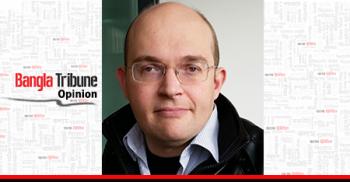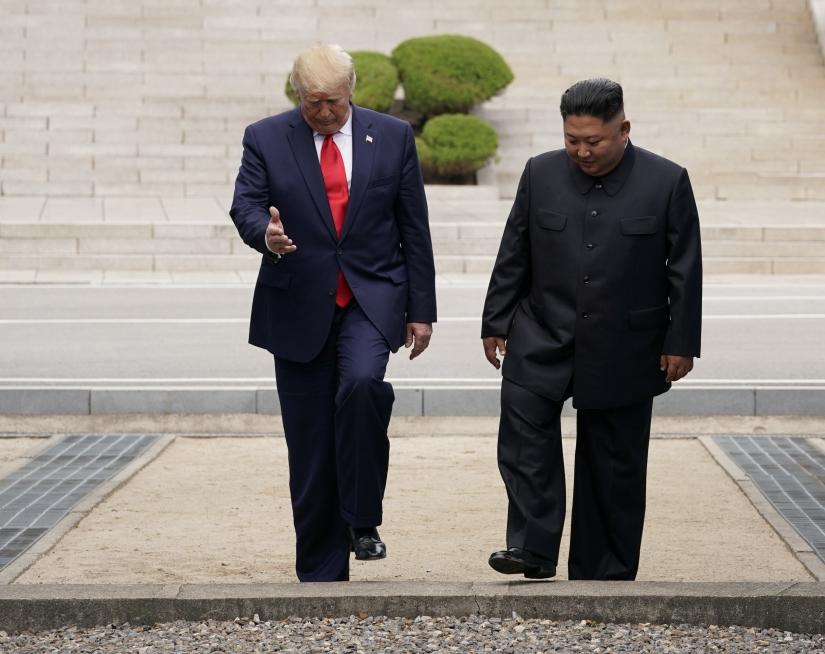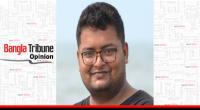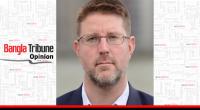 For those who accuse US President Donald Trump of being more at home in the company of dictators, autocrats and authoritarian rulers than with democratic leaders, the past week has provided ready ammunition.
For those who accuse US President Donald Trump of being more at home in the company of dictators, autocrats and authoritarian rulers than with democratic leaders, the past week has provided ready ammunition.
As protesters took to the streets in Hong Kong calling for democracy and human rights, Trump's most successful meetings at the Group of 20 summit in Osaka last week appear to have been with leaders accused in the West of denying those liberties. With Chinese President Xi Xinping, the focus was on easing the trade war between Beijing and Washington, while with Russian President Vladimir Putin, Trump joked of "getting rid" of troublesome journalists. Trump had what seemed an equally friendly meeting with Saudi Crown Prince Mohammed bin Salman, despite the international uproar over the murder of columnist Jamal Khashoggi at the Saudi consulate in Istanbul in 2018.
Trump is hardly the first US president to make polite small talk with autocrats although he does seem to seek out and enjoy such encounters more than any recent predecessor. That was evident with his historic few steps into North Korea on Sunday when he became the first sitting US president to visit the isolated state. North Korean President Kim Jong-un welcomed Trump's assertions of a personal connection between the two men, and agreement was reached on restarting stalled nuclear talks despite widespread scepticism in the US national security establishment.
 In many respects, what was most striking about Trump’s activity in Osaka was how much of it will have been contrary to the advice of the US government apparatus, including his own political appointees. On a host of issues in recent weeks and months, the US president has shown a deep distrust of even many of his inner circle.
In many respects, what was most striking about Trump’s activity in Osaka was how much of it will have been contrary to the advice of the US government apparatus, including his own political appointees. On a host of issues in recent weeks and months, the US president has shown a deep distrust of even many of his inner circle.
It's an approach that was also seen in the confrontation with Iran, when Trump appeared to shock many of even his closest advisers last month by stepping back from a military strike following the shooting down of a US drone. This pointed to a schism with National Security Advisor John Bolton and Secretary of State Mike Pompeo. Both are hawkish figures who want a tougher line on Tehran and other perceived US foes. According to the Wall Street Journal, Trump complained that some of those around him were trying to push him into war with Iran, something he described as "disgusting". "We don't need any more wars," the newspaper quoted him as saying.
This incident, the G20 meetings and the North Korea visit point to the same paradox of the Trump presidency. It is not just that Trump relishes ignoring advice and upending the expectations of those around him. It is that while he tends towards more aggressive, disruptive action than most of his advisers recommend, he is also more conciliatory.
It's a dynamic that is easily interpreted simply as being unpredictable, but it does contain some logic. It also opens the door to diplomatic "off-ramps" at times when rising tensions have otherwise seemed unstoppable.
Amid all the criticism of Trump over North Korea, it's easy to forget that in his first year in office he was roundly blamed for talking up tensions. As Pyongyang tested ever more powerful rockets and warheads, the US president appeared to be doing everything in his power to suggest he was considering military action. Only an unexpected diplomatic breakthrough by South Korea at the 2018 Winter Olympics - which opened the door to the first Trump-Kim meeting - provided a reason to ease the tension.
North Korea almost certainly will not give up its nuclear warheads, but that is not the outcome the United States is realistically seeking. What Washington most set its sights on was a halt to Pyongyang's trajectory towards having long-range rockets and warheads capable of hitting the continental United States – and the hiatus in testing such weapons since last year appears to have done just that, at least for now.
Rather than achieving some improbable disarmament deal, Trump’s focus now appears to be on simply keeping dialogue going, ensuring Kim feels secure enough to avoid restarting those tests. It may not be a true long-term solution, but it has reduced the risk of war.
Indications are growing that Trump wants a deal with China on the economy. As with North Korea – and indeed Iran – Trump created much of the current crisis with China himself, starting a trade war that few around him felt was wise. But it may also be true that as with Iran, Trump is unhappy with the wider trend in Washington of simply seeing China as an enemy - a position increasingly common in the Pentagon. Having until now been more aggressive than the Washington consensus, Trump seems open to showing greater openness to China than many think wise – including easing restrictions on US firms trading with Chinese telecoms company Huawei, seen by many Western security experts as a major security risk.
In contrast to Barak Obama's presidential administration, Trump has little or no interest in allowing relationships to be defined by democracy or human rights. Pompeo had said Trump would specifically raise the issue of Hong Kong with China, but it appeared largely to be swept under the carpet. Khashoggi's killing also appears not to have been a huge irritant during talks with the Saudi Crown Prince. With Putin, Trump seemed envious of the Russian leader's level of domestic control.
That's unsettling on a number of levels. But it will make those countries less nervous of US interference and potential "regime change" - worries that have contributed to tensions over the past decade.
Betting global peace on the outcome of Trump's moods and temperament might seem a risky bet but for now, that's what is happening. Last week - indeed, last month, over Iran's shooting down of a US drone - showed him in a conciliatory phase.
As long as he keeps that up, it might even make the world a safer place, at least temporarily. The United States has, indeed, had too many wars of late. Finding common ground with its adversaries is a laudable goal. But democracy and human rights are also under threat in this era, and choosing to ignore that may also have unpredictable, unpleasant long-term costs.
A former reporter for Reuters, Peter Apps is a writer on international affairs, globalisation, conflict and other issues. He is the founder of the Project for Study of the 21st Century (PS21), a non-national, non-partisan, non-ideological think tank. Paralysed by a war-zone car smash in 2006, he also blogs about his disability and other topics.


